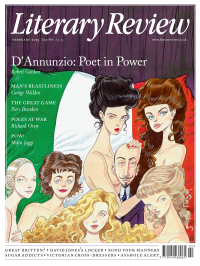Oliver Dennis
Before Voss
Happy Valley
By Patrick White
Jonathan Cape 407pp £18.99
From the 1950s onwards, Patrick White set himself the task of supplying his homeland with the mythic version of itself that it had been calling for: one after another, his books took their place as monuments in Australia’s cultural landscape. White’s calling card was his ability to generate epic grandeur by symbolic means. The technique found fulfilment early on in his great novel Voss (1957), based on the wanderings of 19th-century Prussian explorer Ludwig Leichhardt. The book traces a literal and metaphysical journey into the heart of Australia’s interior, and remains remarkable for its intensely clear treatment of complex existential themes. Also an unusual love story, it is routinely credited with putting Australian literature on the map.
A necessary part of the experience of reading White is that of surrendering to the ‘built’, almost brick-like quality of his sentences. It is in the laboriousness of their construction that his novels accumulate their celebrated power and sense of space.
The particular interest of The Hanging Garden – published last

Sign Up to our newsletter
Receive free articles, highlights from the archive, news, details of prizes, and much more.@Lit_Review
Follow Literary Review on Twitter
Twitter Feed
Under its longest-serving editor, Graydon Carter, Vanity Fair was that rare thing – a New York society magazine that published serious journalism.
@PeterPeteryork looks at what Carter got right.
Peter York - Deluxe Editions
Peter York: Deluxe Editions - When the Going Was Good: An Editor’s Adventures During the Last Golden Age of Magazines by Graydon Carter
literaryreview.co.uk
Henry James returned to America in 1904 with three objectives: to see his brother William, to deliver a series of lectures on Balzac, and to gather material for a pair of books about modern America.
Peter Rose follows James out west.
Peter Rose - The Restless Analyst
Peter Rose: The Restless Analyst - Henry James Comes Home: Rediscovering America in the Gilded Age by Peter Brooks...
literaryreview.co.uk
Vladimir Putin served his apprenticeship in the KGB toward the end of the Cold War, a period during which Western societies were infiltrated by so-called 'illegals'.
Piers Brendon examines how the culture of Soviet spycraft shaped his thinking.
Piers Brendon - Tinker, Tailor, Sleeper, Troll
Piers Brendon: Tinker, Tailor, Sleeper, Troll - The Illegals: Russia’s Most Audacious Spies and the Plot to Infiltrate the West by Shaun Walker
literaryreview.co.uk